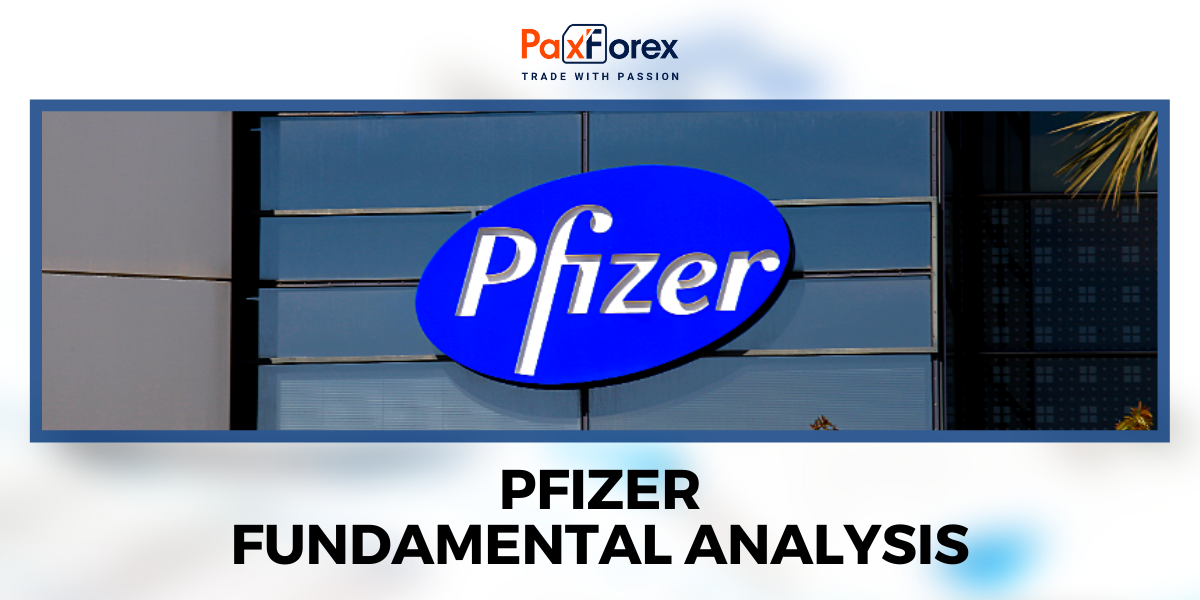
Source: PaxForex Premium Analytics Portal, Fundamental Insight
Many investors are struggling to identify compelling reasons to invest in Pfizer at this juncture, particularly when assessing the company's stock market performance this year. Pfizer's shares have experienced a discouraging decline of 29% since January, which is quite disheartening, especially in light of the broader market's significant rebound following last year's downturn.
Pfizer is grappling with a substantial drop in sales within its coronavirus-related portfolio and the lingering uncertainty surrounding the industry's future. Nevertheless, despite these challenges, there are numerous strong justifications for considering an investment in Pfizer. Let's explore three of these rationales.
- Pfizer is currently experiencing a remarkable streak of approvals
In the world of pharmaceuticals, the recipe for sustained relevance and business improvement seems straightforward, at least in theory. It involves developing new medications or vaccines to replace older ones that have lost their patent exclusivity. However, this endeavor is both costly and time-intensive, and even the largest pharmaceutical companies may not introduce many new products in a single year.
For Pfizer, the norm has typically been one or two new approvals per year, as indicated by CEO Albert Bourla. However, the current year stands out as an exception. The company has been on an impressive streak, securing approvals for four entirely new drugs and one vaccine already—with still four months remaining in the year.
Another way to put Pfizer's accomplishment into perspective is by considering the broader landscape. In the current year, the U.S. Food and Drug Administration (FDA) has given the green light to 35 brand-new drugs (excluding vaccines). Remarkably, Pfizer alone has played a pivotal role in 11% of these approvals.
Furthermore, Pfizer anticipates further approvals on the horizon. Etrasimod, a potential remedy for ulcerative colitis, may receive regulatory clearance by year-end, along with MenABCWY, a promising meningococcal vaccine.
Looking ahead to the next year, Pfizer is poised to maintain its success on the regulatory front. The company is diligently constructing a notable portfolio of novel medications and vaccines that are expected to drive sales growth for years to come, all without the looming concerns of patent expiration. This development bodes exceptionally well for Pfizer and its investors.
- This Acquisition Holds Immense Potential
On March 13, Pfizer made a significant announcement regarding its acquisition of Seagen for a substantial $43 billion in cash. Seagen is a prominent biotechnology firm specializing in the development of cancer treatments. With four approved products and robust sales growth, Seagen has been making noteworthy strides. In the second quarter, the company recorded a remarkable 21.4% year-over-year increase in total revenue, reaching $603.8 million.
However, Pfizer's interest in Seagen goes beyond its existing successes. The true allure lies in Seagen's innovative potential within the realm of oncology. Seagen boasts an impressive pipeline, encompassing roughly three dozen programs spanning various facets of cancer treatment, including colorectal, breast, and bladder cancer.
Pfizer's oncology portfolio has faced challenges in recent times, with Q2 sales declining by 4% year over year to approximately $3 billion. The incorporation of Seagen is poised to provide an instant boost, steering Pfizer in a more favorable direction. Furthermore, with Pfizer's support, Seagen should be better equipped to expedite the progression of many pipeline programs, potentially achieving breakthroughs more swiftly than it could have done independently.
As CEO Albert Bourla articulated at the time of the acquisition announcement:
"We are not merely acquiring the golden eggs; we are acquiring the goose that lays the golden eggs. What is of paramount importance to us is the preservation of Seagen's capacity for continued innovation and, if possible, achieving even greater success collaboratively than they could have achieved on their own."
- Pfizer's Stock Presents an Irresistible Bargain
Certainly, Pfizer is grappling with its fair share of challenges at present. Sales related to COVID-19 are experiencing a sharp decline, consequently impacting the overall revenue and profitability. However, it's crucial to approach comparisons with the pandemic years with a sense of fairness when evaluating Pfizer. The company made a strategic move by partnering with BioNTech to develop a coronavirus vaccine. While this endeavor carried some risk, it ultimately turned out to be a stroke of genius for Pfizer, as the partnership yielded remarkable success.
Although it was never realistic for Pfizer to sustain the extraordinary revenue levels seen in 2021 and 2022, the windfall from the vaccine venture has significantly fortified the company's overall business. For long-term investors, this is the most pivotal consideration. The decline in Pfizer's stock price, while concerning, offers an exceptional opportunity to acquire shares at a discounted rate. Notably, Pfizer's forward price-to-earnings ratio currently stands at just under 11, notably lower than the pharmaceutical industry's average of 16.4.
At these levels, Pfizer appears to be a robust investment prospect, offering the potential for enduring value.
As long as the price is below 39.00, follow the recommendations below:
- Time frame: D1
- Recommendation: short position
- Entry point: 35.39
- Take Profit 1: 34.00
- Take Profit 2: 31.00
Alternative scenario:
If the level of 39.00 is broken-out, follow the recommendations below:
- Time frame: D1
- Recommendation: long position
- Entry point: 39.00
- Take Profit 1: 40.00
- Take Profit 2: 44.00













